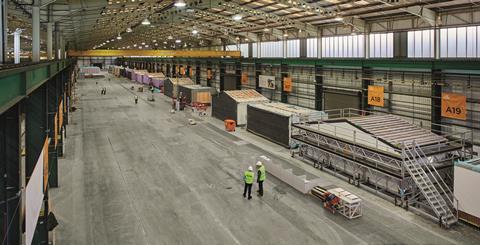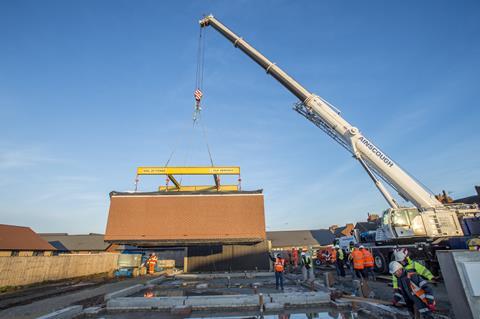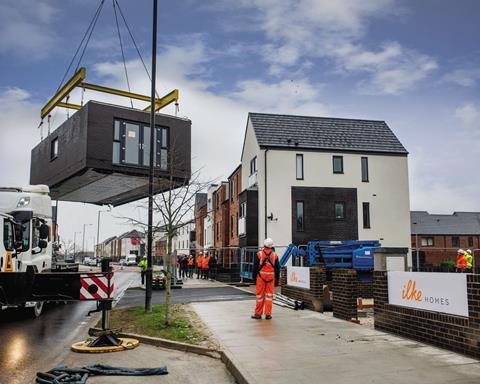Following the collapse of the Knaresborough-based business lauded as a pioneer of modular construction, Matilda Battersby asks the experts what happened and how other businesses in the space can avoid a similar fate

After a month of uncertainty and a two-week scramble to find a willing buyer, modular homebuilder Ilke Homes sank into administration on 30 June.
Lauded by many in the industry for its design, delivery and efficiency, Ilke Homes had seemed like the model for modular to aspire to. Established in 2018 in Knaresborough, North Yorkshire, the company quickly established regional offices in London, Birmingham and Bristol, with Homes England awarding it £30m in funding.
In five years, it created a pipeline of more than 3,000 homes, working with institutional investors, developers, housing associations and councils.
Ilke expanded rapidly, announcing in 2021 that it was set to take on 500 further staff, having secured £60m of funding despite posting significant losses the previous year.
As recently as December 2022, it secured £100m in funding from investors including Fortress Capital, TDR Capital and Sun Capital. This “transformational” sum was to expand production at the firm to 4,000 homes per year and create 1,000 extra jobs.
Things went awry at the start of June 2023, however, when investors told the company’s bosses that they were pulling funding due to concerns over the rate of cash burn. That decision prompted an immediate halt in production at Ilke’s factory and the start of .
At first for the company, but none were ultimately willing to buy the business as a going concern and , a day after .
We asked a range of industry players what went wrong for the homebuilder and what the future holds for the modular methods of construction (MMC) industry more broadly:
Funding model
Martin Valentine, managing director of Positive Homes, blames the reliance on venture capital investment for Ilke’s situation. “I’ve always seen Ilke as a kind of high wire act, because they’ve attracted all this kind of venture capital. Sooner or later, those venture capitalists will want a return on their investment,” he says.
“You can only assume in this case that [the venture capitalists] started worrying they were not going to get a return on our money and they decided to get out quickly. That’s always the worry when you see large fundraising rounds – that it’s going to end badly.”
Positive Homes was one of the first developers to work with Ilke. “With the massive cost of putting a factory together and all the IT that goes into developing systems, if you can’t get those orders delivered quickly, then you’re going to be toast one way or the other,” Valentine says.
“We were among the first to work with Ilke, but they outgrew us quickly. They realised that instead of trying to manage lots of small developers they needed to go down the vertical integration route, buying land and developing their own sites and selling them on.
“It makes perfectly logical sense. But it means more cash that’s sitting in assets. And then, of course, you run into the great British planning system and the whole thing goes to, umm, what’s the polite word for it?”
Graham Kauders, development director at Edaroth, an MMC developer owned by Atkins, says: “From our perspective it would seem that the sheer financial burden of running a large factory has proven too much.
“Deciding to invest in a large production facility, with the aim of establishing a pipeline to feed it, was a direction we chose not to go in, as it incurs all the costs and overheads of running a factory.”
He adds: “When they are on the balance sheet from day one, you obviously need the churn and an ever-increasing amount of project work to make it viable. Clearly that hasn’t come through in this case but they should be recognised for what they have achieved in terms of product and innovation.”
Market factors
Mike De’Ath, a partner at HTA Design, which currently has a 604-home project with Ilke near the Beeston Canal in Nottinghamshire, blames a combination of unforeseeable events and a lack of government support.
“The ongoing uncertainty of the environment and the government dropping housing targets, coming together with covid-19, the war in Ukraine and rising inflation has created almost unbelievable challenges,” he says.
“These are once-in-a-lifetime events which are coming at the same time. So I think we are genuinely in a difficult place for housing delivery.
“Many housing delivery organisations have gone bust in the last 20 or 30 years. This has always been the case. But we are a remarkably resilient sector and everyone’s going to be picking up pieces of all the organisations that fall by the wayside. We do pick them up and we do get going again.”
>> See also:
>> See also:
>> See also:

Planning problems
Planning delays and planning risk are consistently cited as some of the biggest challenges faced by MMC developers. Rightly or wrongly, there is a perception that modular developments are boxy and do not always meet high architectural standards.
Kauders says: ”Pipeline and planning are probably the two key issues facing the industry and of course one feeds the other. In the first instance, can we get the land to build on? Can we get it unlocked and through the planning process in a reasonable time frame?
“The planning process doesn’t discriminate whether the project is for affordable housing; whether it is being delivered in MMC or traditional. And that’s actually part of the problem.

He continues: ”Perhaps planning should prioritise a scheme if it is affordable housing, and fast track applications where there is an urgent need. As an MMC sector we can deliver at pace and scale due to the production methods we employ.”
The government is currently consulting on bringing in “design codes” which could make it harder still for MMC providers, as the nature of the efficiency of their production is based on replicating the same designs or variations of those designs at scale.
“If you’ve got a big set-up and a big factory, you want the same or similar house types because every time you produce a panel you have to change the rig and all the set-up. You want to change that as seldom as possible to actually get the efficiencies,” says Manny Atkinson, a director at BTP architects.
Positive Homes has a project with Ilke in East Leake, near Loughborough, that “would have been built by now” were it not for planning delays. “It’s on the edge of a village, a perfect, obvious site that’s really accessible. But planners have said no, and now we’re sort of in a bit of an argument over it,” Valentine says.
“The whole thing was ready to go. But now we have to say, ‘Sorry, we can’t do it until we unravel all of this’.”
Uncertainty in innovation
Another factor that could have contributed to the nervousness of funders, whether venture capital or otherwise, is how new the sector is. While this is an advantage in lots of ways, there is an argument that it is untested over the longer term.
“I was surprised to hear about Ilke because it seemed robust as a business. I’ve seen their houses and it’s a great product, so I can only guess at what happened to them entering administration,” Atkinson says.
“A lot of it comes down to the volume required to keep the factories open, to keep the pipelines turning over. But then, also, I think the sector is very nervous of MMC because there isn’t really a product that has stood the test of time for 40, 50 or 60 years and is still there.”
He adds: “If you think about the flatpack houses built in the 1970s, you don’t refurbish them, you pull them down.”
De’Ath says: “These organisations, like Ilke and Swan, that are falling or struggling are pioneers and should be celebrated. They are innovating in an unfriendly marketplace. It is really, really difficult right now even for traditional housing delivery.”
What will happen next?
Valentine is confident that Ilke will be bought out of administration. “They were always going to wait for it to go into administration to get the lowest possible price, a few pennies in a pound. But now someone’s going to get a bargain with all the IP that Ilke has built up. Fingers crossed Ilke will come out the other side of it,” he says.
“This was always a risk. The spike in material prices and combined with a whole load of other things going on – the rise in inflation and the world generally. And it’s a real shame. It’s a terrible shame.
De’Ath agrees that Ilke mark two might emerge from the ashes of administration. “They could come back,” he says. ”Just look at all the big failures, all the organisations that have fallen in the past.
“Their schemes have continued, someone has come in to pick them up and continue with them. It’s not just modular that’s facing this situation. It’s not something unique to MMC. It’s endemic to the industry.
“In the last downturn in 2009 I think we lost 60% of SMEs in the country. It wasn’t how those businesses were run, it was the underlying economy. Unfortunately we’re at a time when the government seems to have turned its back on the delivery of housing.
“We will have to wait and see what happens, probably after the next election. In the meantime, it’s going to be very hard for everyone.”
Meanwhile, other MMC players are emerging to take Ilke’s place. This week Vistry announced it will reopen the t acquired as part of its merger with Countrywide, intending to produce 6,000 homes per year from it.
They could come back… Just look at all the big failures, all the organisations that have fallen in the past. Their schemes have continued, someone has come in to pick them up and continue with them.
Mike De-Ath, partner, HTA Design
Essex-based housebuilder Weston Homes has also taken possession of a £40m MMC factory from which it plans to supply itself and other developers with up to 4,000 steel-frame homes per year.
“A lot of people have asked us why we’re opening a new factory when everybody else is closing theirs. They say, what’s different about yours?” says Bob Weston, chairman and managing director of Weston Homes.
“I’ve never been a supporter or a believer in volumetric building. What we’re doing in our modern methods of construction is not volumetric. We are taking traditional methodology, traditional tradesmen, taking them off the site and building components in a factory.”


























No comments yet